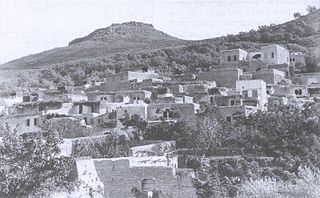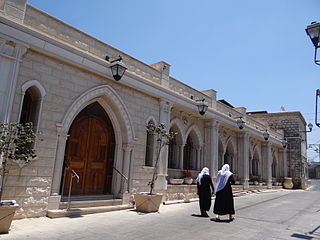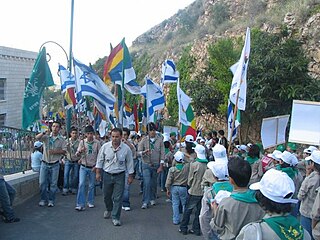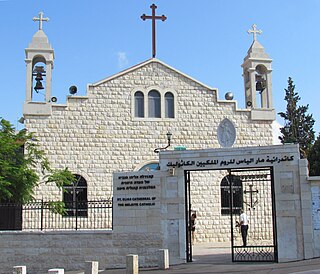
The demographics of Israel, monitored by the Israel Central Bureau of Statistics, encompass various attributes that define the nation's populace. Since its establishment in 1948, Israel has witnessed significant changes in its demographics. Initially formed as a homeland for the Jewish people following the Holocaust in World War II, Israel has attracted Jewish immigrants from around the globe. Consequently, the Jewish population in Israel is incredibly diverse, with roots spanning Europe, Asia, Africa, and the Americas.

Hittin was a Palestinian village located 8 kilometers (5 mi) west of Tiberias before it was occupied by Israel during the 1948 Arab-Israeli war when most of its original residents became refugees. As the site of the Battle of Hattin in 1187, in which Saladin reconquered most of Palestine from the Crusaders, it has become an Arab nationalist symbol. The shrine of Nabi Shu'ayb, venerated by the Druze and Sunni Muslims as the tomb of Jethro, is on the village land. The village was ruled by the Ottoman Empire from the 16th century until the end of World War I, when Palestine became part of the British Mandate for Palestine. On July 17 1948, the village was occupied by Israel, after its residents fled out of their homes because of Nazareth's occupation. in later years, the Moshavs Arbel and Kfar Zeitim were erected where Hittin used to be.

Arabs are the largest ethnic minority in Israel. They comprise a hybrid community of Israeli citizens with a heritage of Palestinian citizenship, mixed religions, bilingual in Arabic and Hebrew, and with varying social identities. Since the 1948 exodus, the Palestinians that have remained within Israel's 1948 borders have been colloquially known as "48-Arabs". In Arabic, commonly used terms to refer to Israel's Arab population include both "48-Arab" and 48-Palestinian. In Israel itself, Arab citizens are commonly referred to as Israeli-Arabs or simply as Arabs; international media often uses the term Arab-Israeli to distinguish Arab citizens of Israel from the Palestinian Arabs residing in the Palestinian territories.

Isratin or Isratine, also known as the bi-national state, is a proposed unitary, federal or confederate Israeli-Palestinian state encompassing the present territory of Israel, the West Bank and the Gaza Strip. Depending on various points of view, such a scenario is presented as a desirable one-state solution to resolving the Israeli–Palestinian conflict, or as a calamity in which Israel would ostensibly lose its character as a Jewish state and the Palestinians would fail to achieve their national independence within a two-state solution. Increasingly, Isratin is being discussed not as an intentional political solution – desired or undesired – but as the probable, inevitable outcome of the continuous growth of the Jewish settlements in the West Bank and the seemingly irrevocable entrenchment of the Israeli occupation there since 1967.

Daliyat al-Karmel is a Druze town located on Mount Carmel in the Haifa District of Israel, around 20 km southeast of Haifa. In 2021 its population was 18,001.

The Sword Battalion, previously Unit 300 and also known as the IDF Minorities Unit, was an Arab-dominated military unit of the Israel Defense Forces. It predominantly enlisted Druze, who made up the majority in the unit until it was disbanded in 2015, though a sizable number of recruits were Bedouin and non-Arab Circassians. Men from the Druze and Circassian communities are subject to Israeli conscription laws, while Bedouin and other Arabs may voluntarily enlist for military service.

Majdal Shams is a town in the Golan Heights, located in the southern foothills of Mount Hermon. Known as the informal "capital" of the region, the town's residents are almost entirely Druze. Since the 1967 Arab–Israeli War, Majdal Shams has been controlled by Israel, although the international community recognizes it as part of Syria. It was initially administered under the Israeli Military Governorate, but was incorporated into Israel's system of local councils after the Knesset ratified the Golan Heights Law in 1981, effectively annexing the territory in a move that has been officially recognized only by the United States, which did so by through a March 2019 presidential proclamation.

The education system in Israel consists of three tiers: primary education, middle school and high school. Compulsory education takes place from kindergarten through 10th grade. The school year begins on September 1, ending for elementary school pupils on June 30, and for middle school and high school pupils on June 20. Haredi Yeshivas follow an independent schedule, starting on 1 Elul.
Kafr Yasif is an Arab town in the Northern District of Israel. It is located 11 kilometers (6.8 mi) northeast of the city of Acre and adjacent to Abu Sinan and Yarka. The population of Kafr Yasif is half Christian (52.1%) with the rest Muslim (44.9%), and a small Druze community.

Christianity is the third largest religion in Israel, after Judaism and Islam. At the end of 2022, Christians made up 1.9% of the Israeli population, numbering approximately 185,000. 75.8% of the Christians in Israel are Arab Christians. Christians make up 6.9% of the Arab-Israelis.

The WZB Berlin Social Science Center, also known by its German initials WZB, is an internationally renowned research institute for the social sciences, the largest such institution in Europe not affiliated with a university.

Israeli Druze or Druze Israelis are an ethnoreligious minority among the Arab citizens of Israel.

The Israel Studies Review is a peer-reviewed academic journal published on behalf of the Association for Israel Studies by Berghahn Books and covering the study of all aspects of society, history, politics, and culture of Israel. The journal was previously known as the Israel Studies Bulletin from 1992 to 2001 and as the Israel Studies Forum from 2001 to 2010. The editors of the journal since summer 2021 are Oded Haklai and Adia Mendelson-Maoz. Rami Zeedan is the journal's book review editor.
Basic Law: Israel as the Nation-State of the Jewish People, informally known as the Nation-State Bill or the Nationality Bill, is an Israeli Basic Law that specifies the country's significance to the Jewish people. It was passed by the Knesset—with 62 in favour, 55 against, and two abstentions—on 19 July 2018 and is largely symbolic and declarative in nature. The law outlines a number of roles and responsibilities by which Israel is bound in order to fulfill the purpose of serving as the Jews' nation-state. However, it was met with sharp backlash internationally and has been characterized as racist and undemocratic by some critics. After it was passed, several groups in the Jewish diaspora expressed concern that it was actively violating Israel's self-defined legal status as a "Jewish and democratic state" in exchange for adopting an exclusively Jewish identity. The European Union stated that the Nation-State Bill had complicated the Israeli–Palestinian peace process, while the Arab League, the Palestine Liberation Organization, the Organization of Islamic Cooperation, and the Muslim World League condemned it as a manifestation of apartheid.

Melkite Greek Catholic Archeparchy of Akka is an Eastern Catholic diocese of Melkite Greek Catholic Church, directly subject to the Melkite Patriarch of Antioch. Its Cathedral episcopal see is St. Elijah Greek-Melkite Cathedral, in Haifa.
Israelization is a term in sociology, study of culture, and politics of Israel that refers to the processes occurring among minority groups in Israel. A process in which minority groups adopt, at various levels, the lifestyle, language, culture, political and other characteristics of the dominant group in Israel – Israeli-born secular Jews.
Feminism in Israel is a complex issue in contemporary Israeli society due to the varied demographic makeup of the country and the country's particular balance of religion and state issues. For secular Israeli women, the successive campaigns for women's rights and equality reflect a similar timeline and progression as Western democracies. For Israeli Arabs, however, the issue of feminism is strongly linked to Palestinian causes. And for Orthodox Jews, selected women's rights and women's representation in the Israeli Parliament are recently debated issues.

In Israel, the mixed cities or mixed towns are the eight cities with a significant number of both Israeli Jews and Israeli Arabs. The eight mixed Jewish-Arab cities, defined by the Israel Central Bureau of Statistics as those with more than 10% of the population registered as "Arabs" and more than 10% of the population registered as "Jews", include the following seven Israeli cities: Haifa, Lod, Ramle, Jaffa, Acre, Nof HaGalil, and Ma'alot Tarshiha. Approximately 10% of the Arab citizens of Israel live in these seven cities. The eighth city is Jerusalem, in which the Arab part of the city, East Jerusalem, has been annexed by Israel but is not recognized as such under international law.













